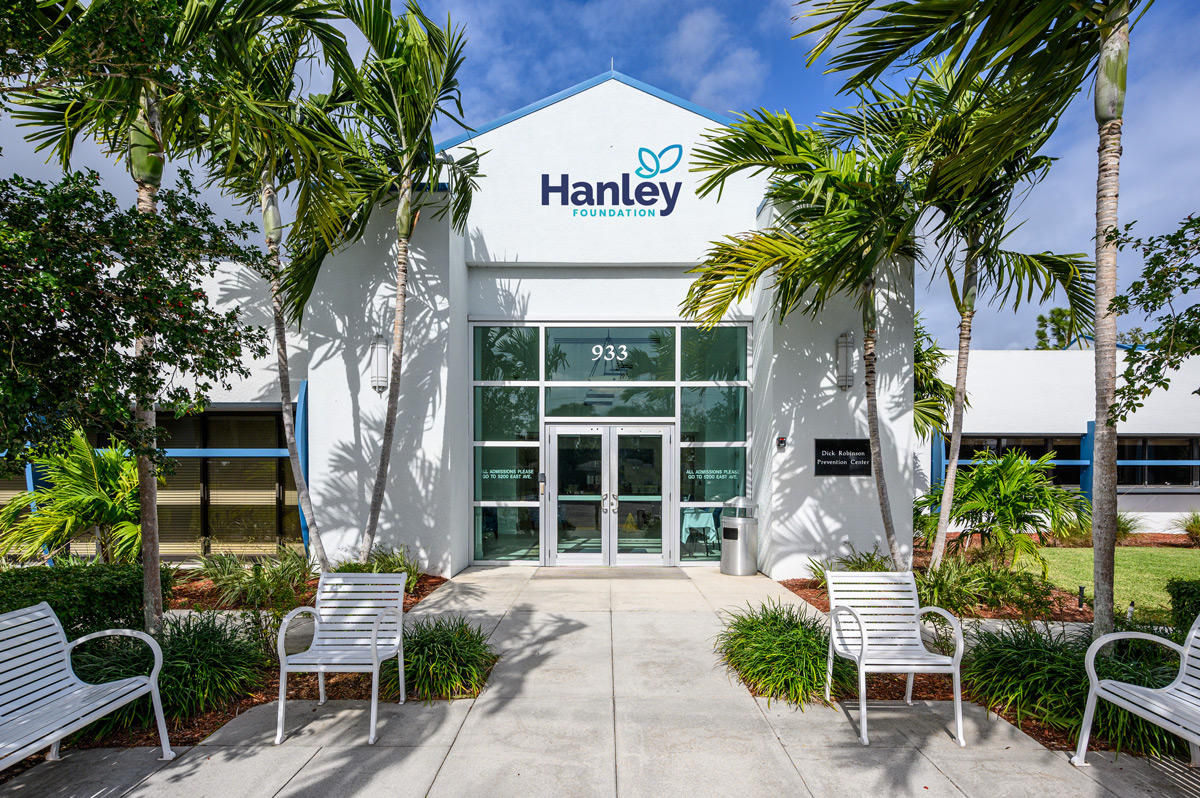Specialized Anxiety Disorder Treatment Centers in Florida

While it’s normal to feel anxious before a major decision, school exam, or work deadline, anxiety disorders go far beyond everyday stress.
These mental health conditions are marked by persistent, overwhelming feelings of fear or worry, with symptoms that often intensify over time and interfere with daily life.
At Hanley Center, we recognize that anxiety does not always occur alongside a substance use disorder. That’s why we created our Residential Mental Health Program, a dedicated space separate from other areas of care, where patients can focus solely on recovery from anxiety and related mental health conditions.
With 24/7 nursing and medical support, the program provides a safe, private, and confidential environment for healing.
As one of the top anxiety treatment centers in Florida, your mental health matters to us.
MENTAL HEALTH DISORDERS
Types of Anxiety Disorders
Anxiety disorder symptoms can disrupt daily life, making it challenging to maintain healthy relationships at home, work, or school.
For many people, anxiety disorders also co-occur with substance use, as individuals may turn to alcohol or drugs in an attempt to cope with their symptoms.
There are several different types of anxiety disorders, each with unique signs, challenges, and treatment needs. Below, we discuss the most common types.
Generalized Anxiety Disorder
Individuals with a generalized anxiety disorder (GAD) display excessive anxiety or worry about loved ones, health, work, social interactions, and everyday life tasks.
The frequency of GAD symptoms is difficult to control and occurs on most days over six months.
GAD symptoms include:
- Feeling restless, tense, or edgy
- Easily fatigued
- Difficulty concentrating
- Brain fog or blanking out
- Irritability
- Muscle tension
- Inability to fall or stay asleep
- Restlessness
- Insomnia and resulting tiredness
An anxiety diagnosis typically involves a thorough assessment by a mental health professional, which may include clinical interviews, self-report questionnaires, and possibly physical examinations or laboratory tests to rule out other medical conditions that could be contributing to anxiety symptoms.
Panic Disorder
Panic attacks are intense bouts of fear with a rapid onset, reaching their peak within a few minutes.
Individuals with panic disorders suffer from frequent unanticipated panic attacks. These debilitating panic attacks occur unexpectedly or respond to a trigger, such as a fearful situation, object, or interaction with a particular person.
During a panic attack, people may experience symptoms such as:
- Heart palpitations
- Accelerated or pounding heartbeat
- Sweating
- Trembling
- Shaking
- Shortness of breath, choking, or smothering
- Feelings of impending disaster
- Feelings of no control
To prevent a panic attack, those with a panic disorder may avoid specific situations, social interactions, behaviors, or visiting places they associate with panic attacks. The anxiety of a potential panic attack and the effort put into preventing panic attacks cause significant problems in various life areas, further adding to their anxious feelings.
Panic disorder treatment involves a combination of therapy, medication, and lifestyle changes aimed at reducing the frequency and intensity of panic attacks, managing symptoms, and improving overall quality of life.
Phobia-related Disorders
Extreme fear or aversion to specific things or situations is known as a phobia.
Phobias create anxiety that is out of proportion to the danger posed by an object or a problem.
Specific or simple phobias may include the fear of heights, flying on airplanes, animals, insects, reptiles, or the sight of blood.
Individuals with a phobia-related disorder may experience the following anxiety-based symptoms:
- Excessive or irrational fear of contact with an object or situation
- Active steps of avoidance of the feared object or situation
- Immediate, intense anxiety upon encountering the feared situation or object
- Unavoidable situations and objects are endured with severe anxiety
Separation Anxiety Disorder
The fear of being separated from a person to whom you are attached and an underlying fear that something detrimental will happen to that individual once separated is known as a separation anxiety disorder.
Individuals with a separation anxiety disorder may avoid being alone and experience nightmares about being separated from attachment figures. Physical separation anxiety symptoms, like stomach pain and headaches, may appear when the separation occurs.
Social Anxiety Disorder
Intense fear of being in public areas, such as in the classroom or workplace, is a symptom experienced by a person with a social anxiety disorder.
Worrying about the embarrassment and negativity associated with social anxiety disorder, these individuals often avoid social situations and then experience the negativity of isolation. For many, the pressure to perform publicly is particularly frightening.
Agoraphobia
Agoraphobia is a type of anxiety disorder that causes people to avoid situations where they fear they might feel trapped, helpless, or embarrassed. People with agoraphobia will have an extreme fear of two or more of the following situations:
- Enclosed spaces
- Open spaces
- Public transportation
- Alone outside of the home
- Lines or crowds of people
People with this anxiety disorder may avoid these situations because they fear that an impending panic attack or other embarrassing experience may occur if they cannot leave the scary situation. In extreme cases, a person may become housebound.
Integrated Treatment Is Key
At Hanley Center, our approach combines comprehensive therapeutic resources designed to support healing on a physical, psychological, and spiritual level.
Because every person’s experience is unique, anxiety disorders may sometimes develop after substance use begins, while in other cases they appear beforehand.
Effective treatment for individuals with co-occurring anxiety disorders should include:
- Ongoing psychiatric services
- Medical care and appropriate medication
- Family education
- Life skills training
- Spiritual care services
- Continuing care planning
- Evidence-based therapies
- Case management
Our individualized treatment plans, which include inpatient care, are designed to support overall well-being by addressing the health of the body, mind, and spirit. Through comprehensive behavioral health assessments, we ensure co-occurring anxiety disorders are identified and treated.
For treatment to be effective, anxiety and panic disorders must be addressed in the same setting by a unified care team. At Hanley Center, highly trained professionals deliver simultaneous treatment for co-occurring anxiety disorders within our multidisciplinary, medically intensive program.
One-on-one sessions with their primary therapists and detailed clinical interviews lay the groundwork for developing an individual treatment plan.
Our treatment teams address each patient’s physical, mental, psychological, and spiritual needs. Every day, our expert staff, including medical professionals, licensed therapists, and psychiatrists meet to review cases and develop personalized solutions. This integrated and specialized model of care helps improve outcomes and enhance quality of life.
Co-occurring disorders can aggravate each other, which can make successful treatment difficult. Our health psychology department offers specialized, evidence-based therapy interventions focused on brain health. Hanley’s Center for Brain Recovery addresses the link between addiction and mental health disorders like anxiety. It simultaneously treats both conditions, providing our patients with a better chance of a lasting recovery.
At Hanley Center for Brain Recovery, we provide intensive psychological testing, such as:
- Personality Inventory for DSM-5—Brief Form (PID-5-BF)
- CNS VS (Central Nervous System Vital Signs)
- MMPI-2 (Minnesota Multiphasic Personality Inventory-2)
- MCMI (Millon Clinical Multiaxial Inventory)

People Can and Do Recover
With the proper approach to co-occurring disorders, individuals succeed in leading lives filled with hope and courage. Personalized, integrated, intensive treatment is the key. Individuals with co-occurring disorders deserve long-term support and therapeutic interventions.
Hanley Center is a leading addiction treatment center in West Palm Beach that recognizes that co-occurring anxiety and substance use disorders are interrelated and require concurrent treatment. Recovery consists of mental, physical, psychological, and spiritual well-being.
Start your journey to freedom and fulfillment today with one of the leading anxiety treatment centers in Florida. Call us at. 561-841-1033.
Start your journey to freedom and fulfillment today with one of the leading anxiety treatment centers in Florida. Call us at 561.841.1033.
Insurance Can Cover up to 100% of Treatment
We offer free, no obligation health insurance benefit checks. If you are currently insured, your treatment could be covered partially or in full.
Frequently Asked Questions About Anxiety Treatment in Florida
Living with an anxiety disorder can feel overwhelming, but professional treatment provides the tools and support needed to find relief.
Below, we’ve answered common questions about anxiety treatment at Hanley Center to help you or your loved one take the next step toward recovery.
How do I know if I need professional anxiety treatment in Florida?
If anxiety is interfering with daily life, relationships, or your ability to function at school or work, professional treatment may be necessary. Common anxiety disorder signs include persistent worry, panic attacks, avoidance behaviors, or reliance on unhealthy coping strategies such as alcohol or drugs.
What are the best therapies for anxiety disorders, panic disorder, and phobias?
Evidence-based therapies such as cognitive behavioral therapy (CBT), dialectical behavior therapy (DBT), and exposure therapy are often effective. At Hanley Center, these therapies are delivered alongside holistic and supportive services to address each patient’s physical, mental, and spiritual well-being.
Can anxiety be treated without medication at Hanley Center?
Yes. While medications may be helpful for some patients with anxiety, others find relief through therapy, lifestyle changes, and alternative supports. Our treatment team develops personalized care plans, and medication is only used when clinically necessary.
What is the difference between everyday anxiety and a diagnosed anxiety disorder?
Everyday anxiety is a normal response to stressful situations, such as taking a test or meeting a deadline. An anxiety disorder, however, involves persistent and excessive worry, fear, or panic that doesn’t go away and often worsens over time, impacting quality of life.
How long does inpatient anxiety treatment in Florida usually take?
The length of treatment varies based on each client’s needs and progress. At Hanley Center, inpatient programs generally last about 45 days, and many clients stay a bit longer for mental health stabilization. This timeframe allows individuals to build coping skills, address underlying issues, and create a solid foundation for long-term recovery.
What should I expect during the anxiety treatment intake process?
During intake, our licensed professionals conduct a comprehensive assessment of mental health, physical health, and any co-occurring substance use disorders. This helps us create a personalized treatment plan that meets the individual’s unique needs.
Does Hanley Center offer residential anxiety treatment without a substance use disorder?
Yes. Hanley Center has a dedicated Residential Mental Health Program for patients seeking treatment for anxiety and other mental health disorders without a substance use disorder.
How does family therapy support anxiety recovery?
Family therapy provides education, communication strategies, and emotional support for loved ones. It helps families understand anxiety disorders and work together to create a supportive home environment for long-term recovery.
Does insurance cover anxiety disorder treatment in Florida?
Many insurance plans provide coverage for anxiety disorder treatment. At Hanley Center, our admissions team helps patients and their families navigate the insurance process to understand available benefits and options.
Information entered on this form will not be used to initiate SMS.
Address: 933 45th Street
West Palm Beach, FL 33407



